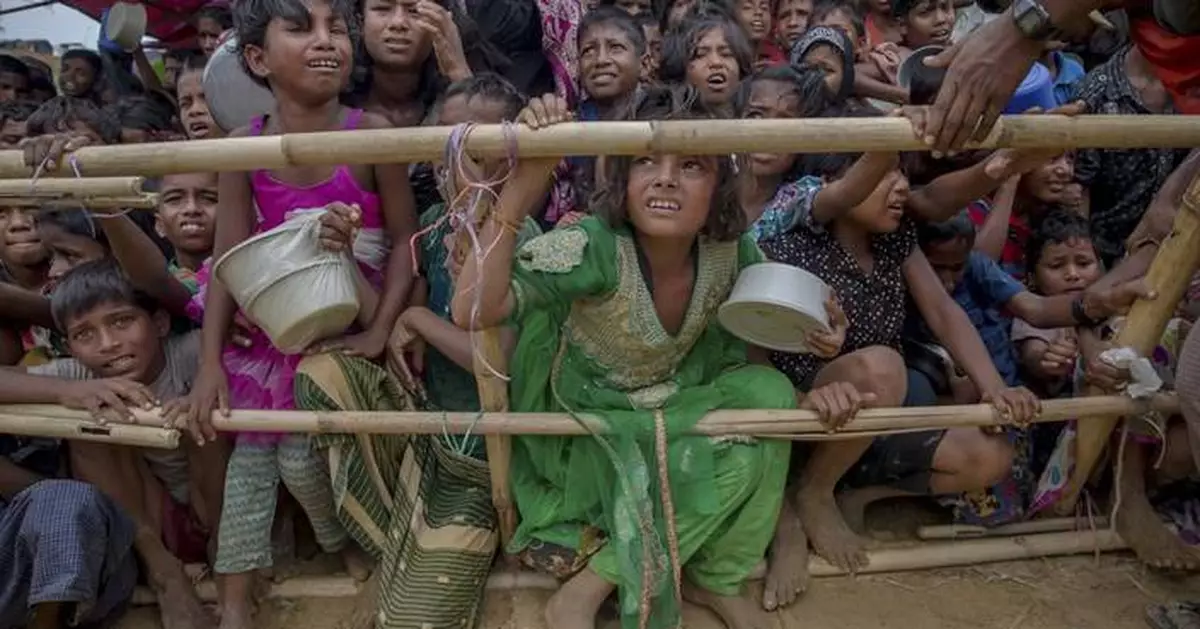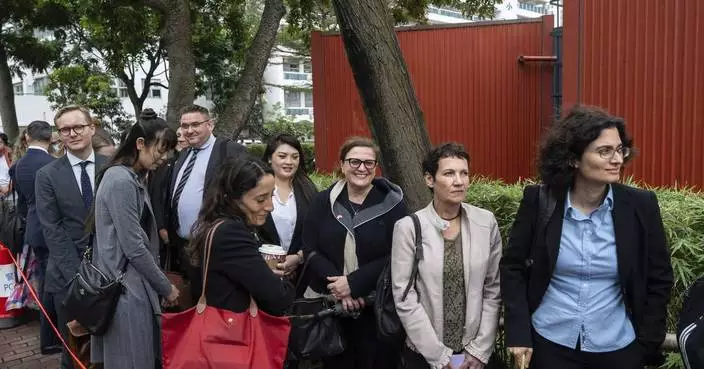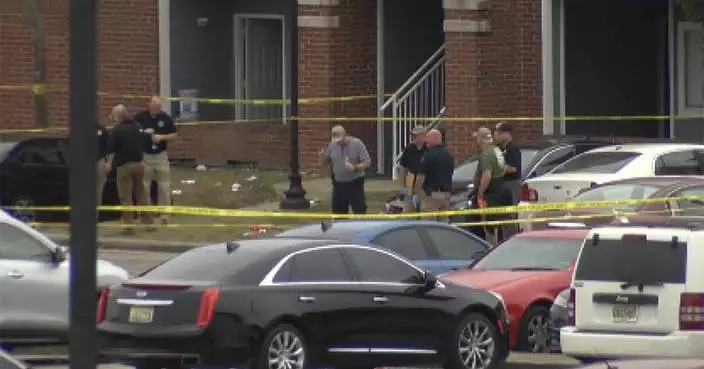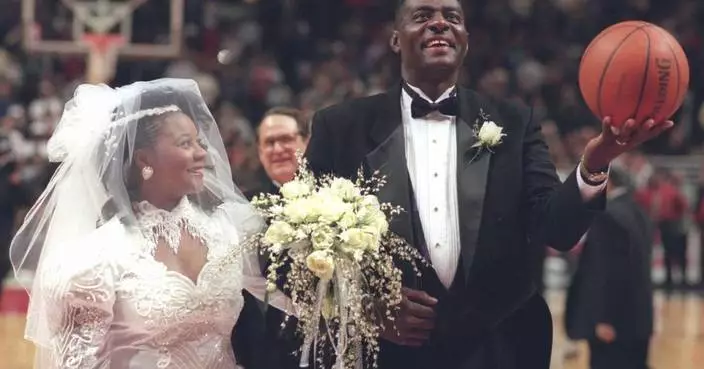BANGKOK (AP) — The U.N.’s human rights chief joined a chorus of concern Friday for members of Myanmar’s Muslim Rohingya ethnic minority after many were reported killed in recent fighting between the military government and the Arakan Army, an armed ethnic rebel group.
According to a statement from the Geneva office of the U.N. High Commissioner for Human Rights Volker Türk, he “expressed grave alarm and raised profound concerns about the sharply deteriorating situation across Myanmar, particularly in Rakhine State where hundreds of civilians have reportedly been killed while trying to flee the fighting.”
It said his agency had documented that ”both the military and the Arakan Army, which now controls most of the townships in Rakhine, have committed serious human rights violations and abuses against the Rohingya, including extrajudicial killings, some involving beheadings, abductions, forced recruitment, indiscriminate bombardments of towns and villages using drones and artillery, and arson attacks.”
The statement cited an Aug. 5 attack along the Naf River bordering Bangladesh, when “dozens were reportedly killed, including by armed drones,” but said it was unclear who was responsible.
At the time, The Associated Press reported that at least 150 Rohingya may have been killed by artillery and drone attacks, and cited survivors as saying they believed the attacks were carried out by the Arakan Army.
The group, which is the military wing of the state’s Buddhist Rakhine ethnic group, denied responsibility for the attack on Rohingya fleeing the fighting in the town of Maungdaw, which the Arakan Army has been trying to seize from the army. However, more accounts have since surfaced placing the blame on the group.
Pro-democracy guerrillas and ethnic minority armed forces, including the Arakan Army, have been battling to oust the country’s military rulers since they seized power in 2021 from the elected government of Aung San Suu Kyi.
However, the fighting in Rakhine has raised fears of a revival of organized violence against members of the Rohingya minority.
In 2017, a military counter-insurgency campaign drove at least 740,000 members of their community to Bangladesh for safety. Almost all still remain there in overcrowded refugee camps, unable to return home because of the continuing instability. International courts are investigating whether the 2017 action by the army constituted genocide.
Ahead of the seventh anniversary Sunday of the flight of the Rohingya to escape the counter-insurgency, U.N. Secretary-General Antonio Guterres called on all parties fighting in the country to end the violence and protect civilians, his spokesman said Friday.
The U.N. chief said around 1 million Rohingya are presently sheltering in Bangladesh — and over 130,000 more across the region — “without immediate prospects to return,” spokesman Stephane Dujarric said.
Many Rohingya have lived in Myanmar for generations, but face widespread prejudice and are generally denied citizenship and other basic rights in the Buddhist-majority country.
“Despite the world saying ‘never again’ we are once more witnessing killings, destruction and displacement in Rakhine,” said Türk's statement.
Amnesty International on Wednesday said recent attacks on the Rohingya ”bear a terrifying resemblance to the atrocities of August 2017.”
“Rohingya civilians are now caught in the middle of intensifying conflict in Rakhine State,” said its Myanmar researcher Joe Freeman, adding that the Myanmar military “has forcefully conscripted Rohingya to fight on its side.”
Freeman urged Myanmar’s military to ”immediately end their renewed campaign of violence and refrain from unlawful attacks on civilians.”
New York-base Human Rights Watch last week also raised the alarm about violence in Rakhine.
”Both sides are using hate speech, attacks on civilians, and massive arson to drive people from their homes and villages, raising the specter of ethnic cleansing,” said the group's Asia director, Elaine Pearson.
A joint statement from Rohingya support groups Friday estimated that at least 200 Rohingya were killed on Aug. 5 in what it called “the Naf River Massacre,” and also blamed the Arakan Army.
The Rohingya left in Maungdaw are trapped in intense fighting and “in urgent need of international protection and humanitarian assistance,” said the statement, endorsed by more than 100 activist groups.
Associated Press writer Edith M. Lederer at the United Nations contributed to this report.
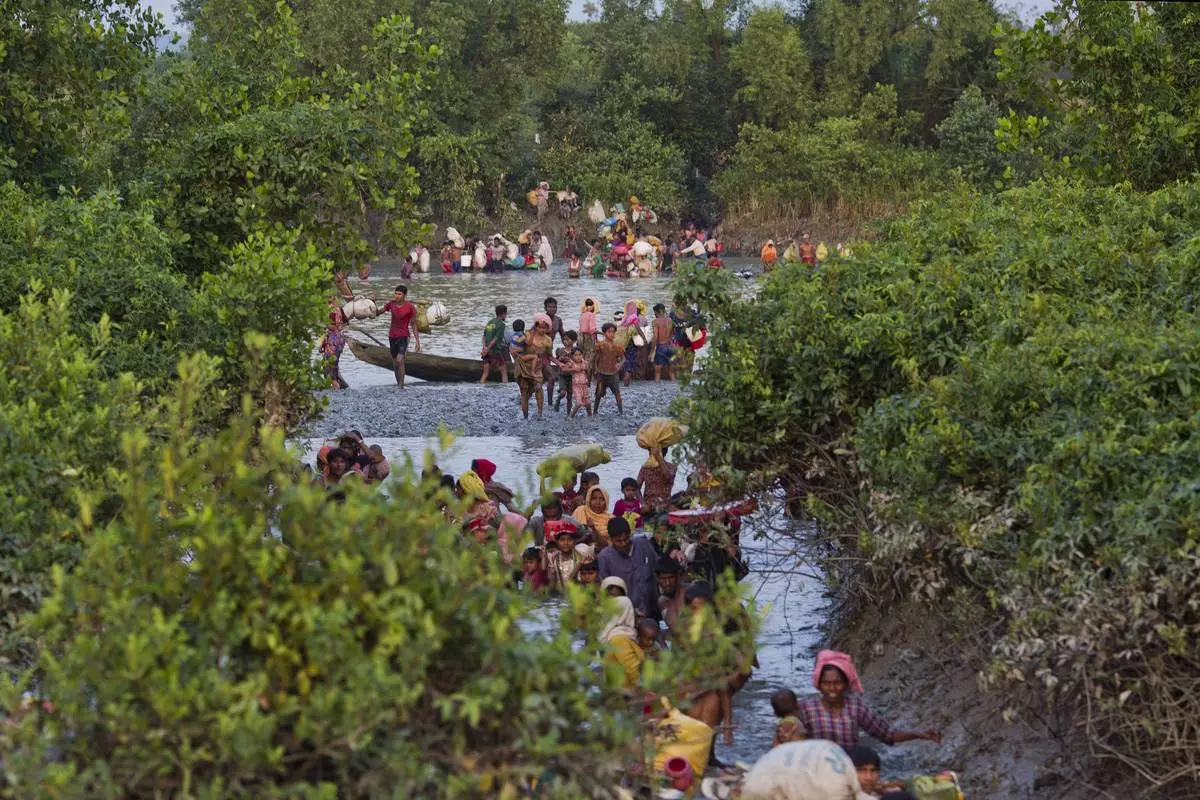
FILE - Groups of Rohingya Muslims cross the Naf river at the border between Myanmar and Bangladesh, near Palong Khali, Bangladesh, on Nov. 1, 2017. At least 150 civilians from Myanmar’s Muslim Rohingya minority may have been killed this week in an artillery and drone attack in the western state of Rakhine that is being blamed on the Arakan Army, a major force in the resistance to military rule.(AP Photo/Bernat Armangue)
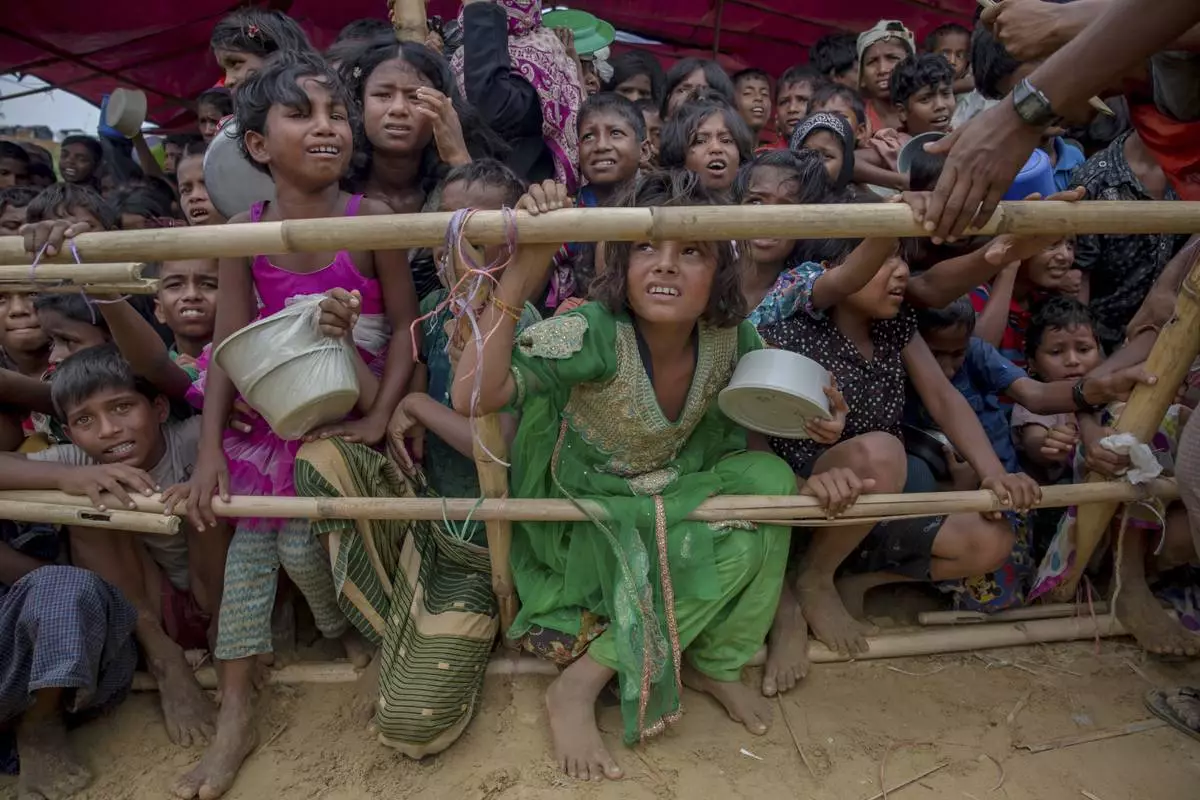
FILE - Rohingya Muslim children refugees, who crossed over from Myanmar into Bangladesh, wait squashed against each other to receive food handouts distributed to children and women by a Turkish aid agency, Oct. 21, 2017, at Thaingkhali refugee camp, Bangladesh. (AP Photo/Dar Yasin, File)
ATHENS, Ga. (AP) — Georgia nursing student Laken Riley texted and called her mom as she headed out for a run to see whether she had time to chat — but then didn't respond to her mother's calls or increasingly frantic text messages.
Riley called her mother at 9:03 a.m. on Feb. 22, and by the time her mother called back about 20 minutes later, the student had encountered Jose Ibarra on a wooded running trail at the University of Georgia, according to trial testimony. Prosecutors said Ibarra killed Riley after a struggle, and data from Riley's smartwatch shows her heart stopped beating at 9:28 a.m.
After Riley failed to answer the phone, her mother, Allyson Phillips, texted her several times, casually at first but then with increasing concern, according to data pulled from Riley's phone.
At 9:37 a.m., her mother texted, “Call me when you can.” Phillips called twice, and when her calls went unanswered, she texted her daughter at 9:58 a.m., “You’re making me nervous not answering while you’re out running. Are you OK?" Phillips texted again at 11:47 a.m., writing, “Please call me. I’m worried sick about you.” She and other family members continued to call Riley.
Phillips cried in court as the text messages were read aloud by Georgia police Sgt. Sophie Raboud, who examined data from Riley's phone. Raboud also testified about video from surveillance cameras near the wooded trail, and Phillips and some other family members and friends cried as video played showing Riley running on the trail the morning of her death.
Ibarra, 26, is charged with murder and other crimes in Riley’s death in February, and his trial began Friday. He waived his right to a jury trial, meaning the case will be decided alone by Athens-Clarke County Superior Court Judge H. Patrick Haggard.
The prosecution rested its case Tuesday afternoon after calling more than a dozen law enforcement officers, Riley's roommate and a woman who lived in an apartment with Ibarra to testify. The judge then asked Ibarra if he wants to testify and he said no.
The killing added fuel to the national debate over immigration when federal authorities said Ibarra illegally entered the U.S. in 2022 and was allowed to stay in the country while he pursued his immigration case. Riley, 22, was a student at Augusta University College of Nursing, which also has a campus in Athens, about 70 miles (115 kilometers) east of Atlanta.
Surveillance video also showed a man who prosecutors say is Ibarra walking around an apartment complex where a female graduate student said someone tried to get into her apartment and peered in the window early the day Riley was killed. The man is seen going up to the door of that apartment six times over a period of roughly an hour, twice opening the outer screen door, Raboud testified.
Georgia Bureau of Investigation Special Agent Lucas Breyer testified about reviewing the body camera video from the officer who found Riley's body in the woods. He testified that her clothes were “heavily manipulated,” describing the waistband of her running tights as having been pulled down some and her jacket, shirt and sports bra having been pulled way up.
Dr. Michelle DiMarco, a GBI medical examiner, conducted the autopsy of Riley's body and testified that Riley had injuries, including scrapes, bruises and cuts, to her head, neck, torso, abdomen, left hand and left leg. Her injuries included eight cuts to her head, including one that fractured her skull, DiMarco said.
Prosecutors have said that Ibarra hit Riley in the head with a rock and DiMarco said the injuries “could be consistent with a rock.” A GBI specialist testified Riley's DNA was found on two rocks at the scene. The DNA specialist also said that Riley's DNA and Ibarra's DNA were both found on a jacket that was retrieved from a trash bin at Ibarra's apartment complex.
Prosecutor Sheila Ross said during her opening statement that Ibarra had gone out “hunting for females” that morning in February and that he killed Riley after a struggle when she “refused to be his rape victim.” Law enforcement officers have testified there was no evidence that Riley was sexually assaulted.
Defense attorney Dustin Kirby said in his opening that Riley’s death was a tragedy and called the evidence in the case graphic and disturbing. But he said there is not sufficient evidence to prove that his client killed Riley.
Throughout the prosecution's case, defense attorneys have asked questions of witnesses that seem designed to create doubt by suggesting that Ibarra's brother Diego could not be excluded as a suspect.
Riley’s parents, roommates and other friends and family packed the courtroom Friday and again Monday and Tuesday.
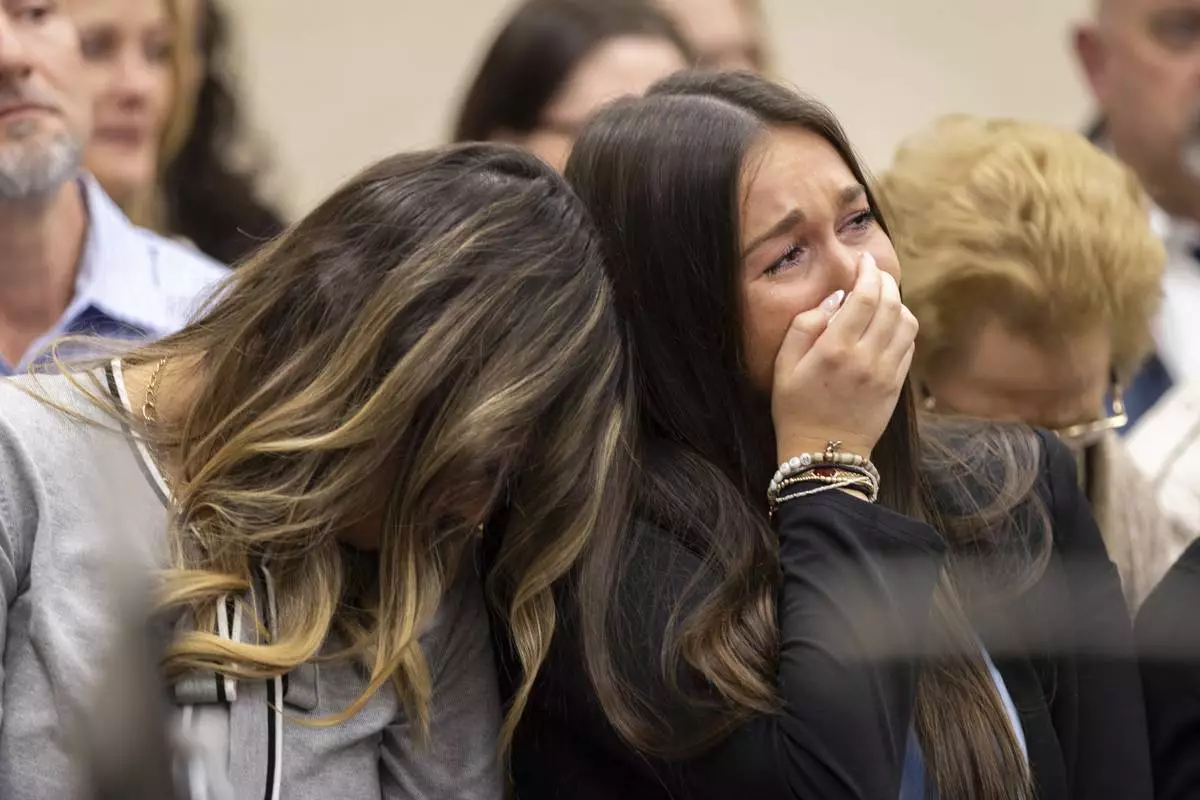
From left, Connolly Huth, roommate of Laken Riley, and Lauren Phillips, Riley's younger sister, become emotional during the trial for Jose Ibarra at the Athens-Clarke County Superior Court on Tuesday, Nov. 19, 2024, in Athens, Ga. (Arvin Temkar/Atlanta Journal-Constitution via AP, Pool)
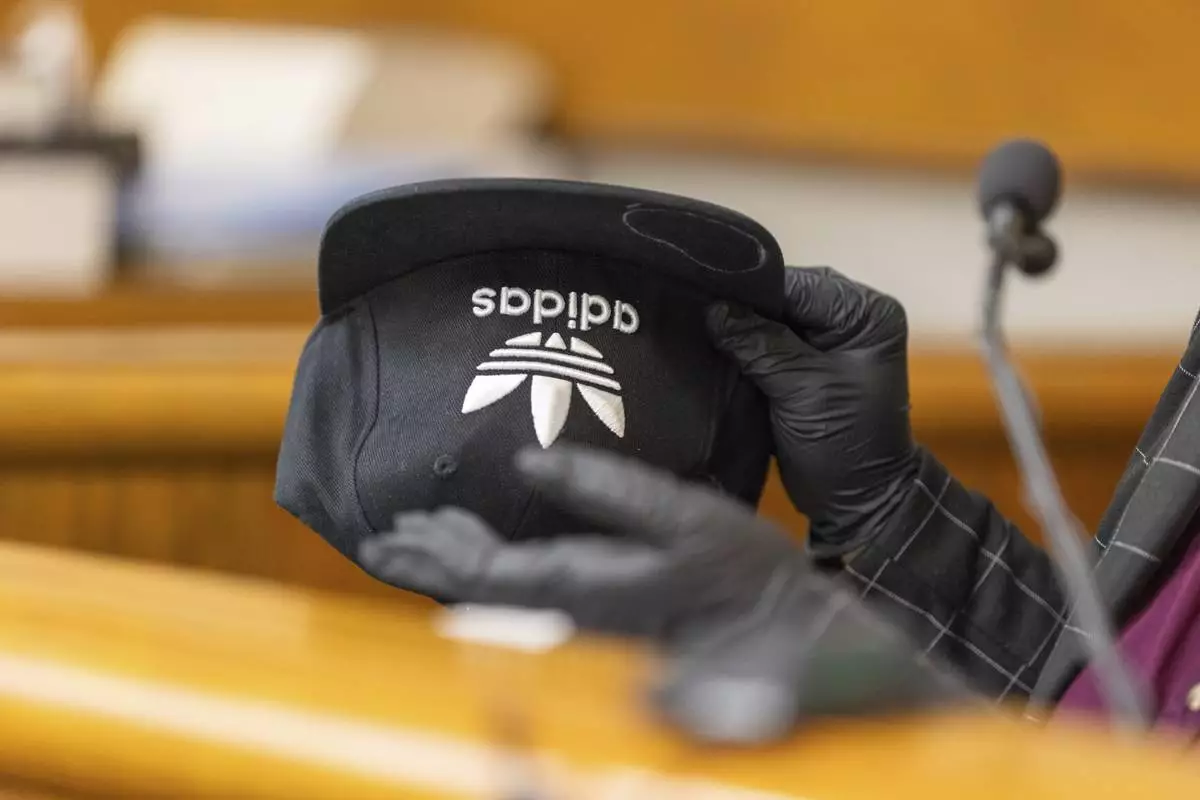
A hat allegedly belonging to Jose Ibarra is presented as evidence during the trial for Ibarra at the Athens-Clarke County Superior Court on Tuesday, Nov. 19, 2024, in Athens, Ga. (Arvin Temkar/Atlanta Journal-Constitution via AP, Pool)
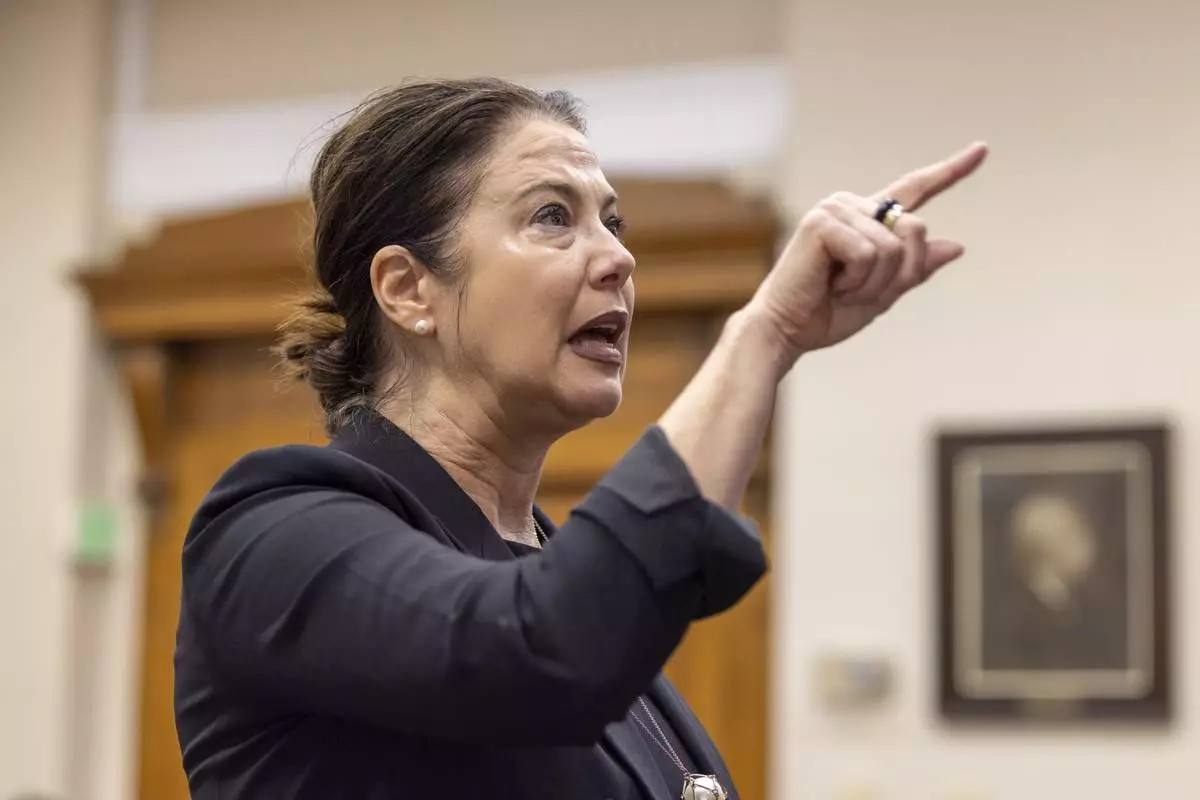
Prosecutor Sheila Ross speaks during the trial for Jose Ibarra at the Athens-Clarke County Superior Court on Tuesday, Nov. 19, 2024, in Athens, Ga. (Arvin Temkar/Atlanta Journal-Constitution via AP, Pool)
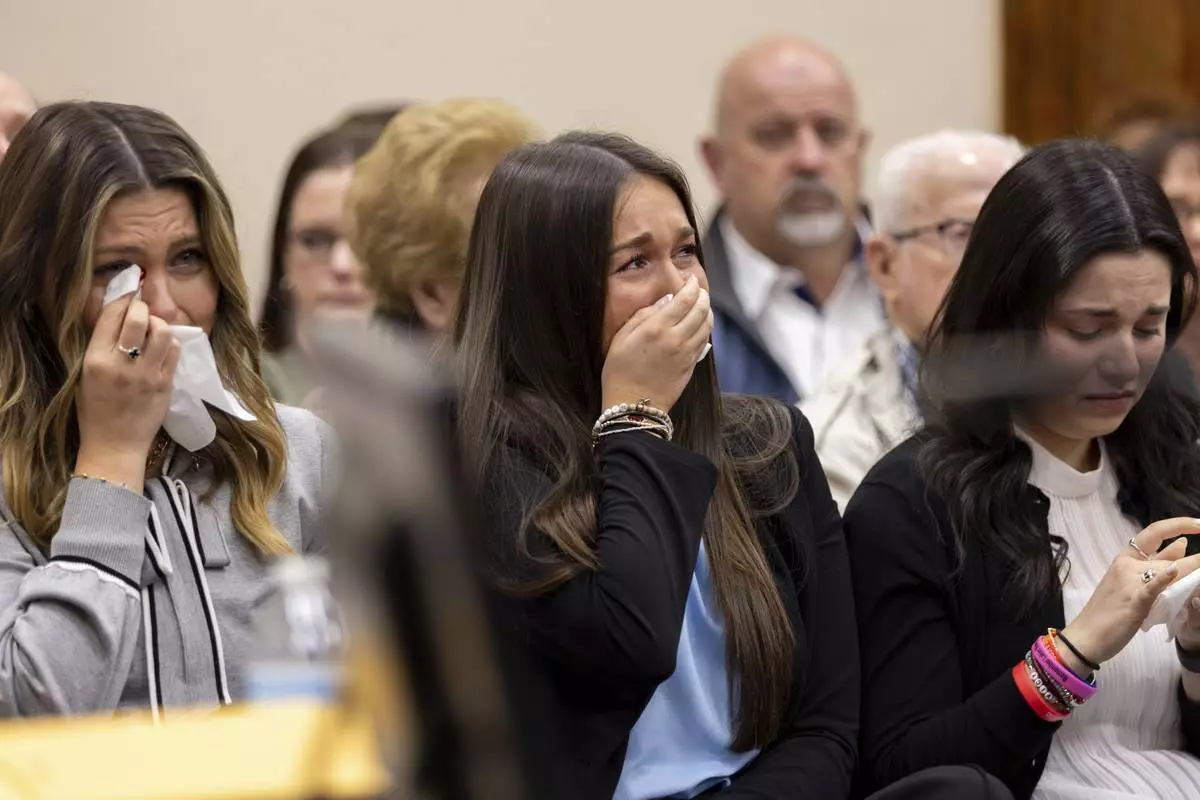
From left, Connolly Huth, Lauren Phillips and Sofia Magana become emotional during the trial for Jose Ibarra at the Athens-Clarke County Superior Court on Tuesday, Nov. 19, 2024, in Athens, Ga. (Arvin Temkar/Atlanta Journal-Constitution via AP, Pool)
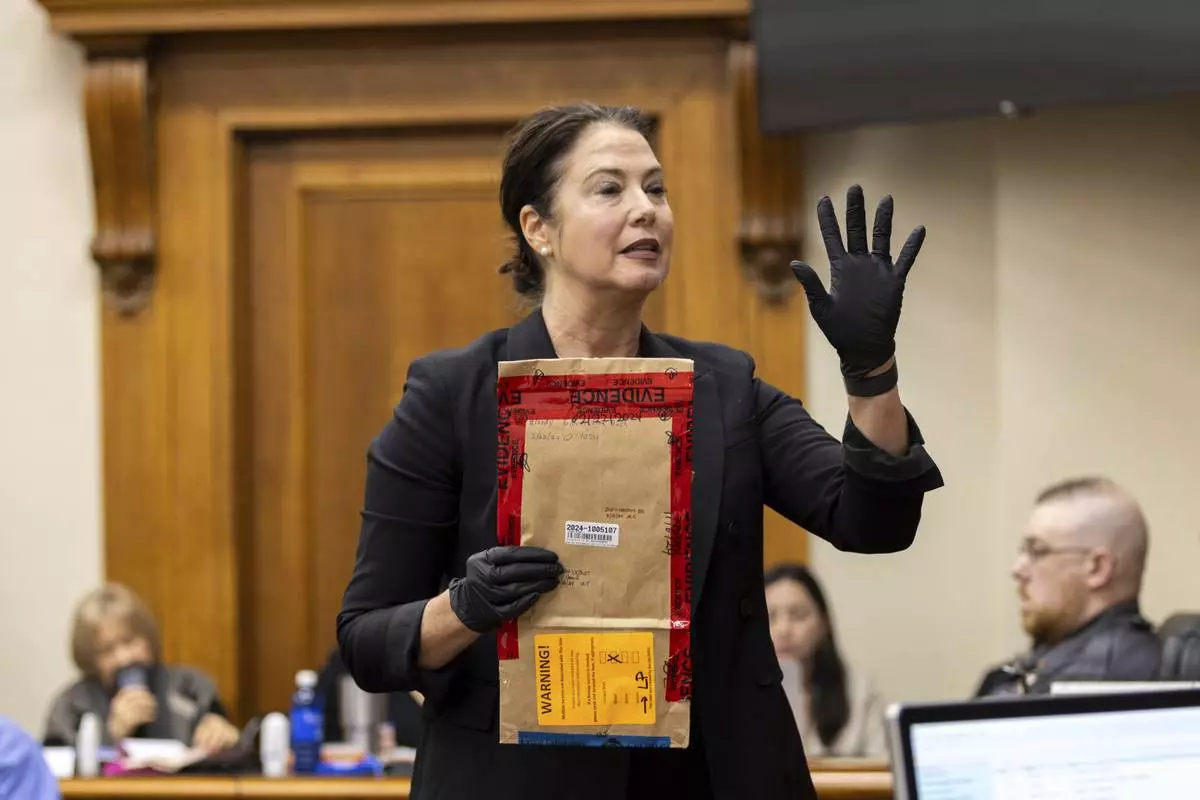
CORRECTS DATE Prosecutor Sheila Ross speaks while holding an evidence bag during the trial for Jose Ibarra at the Athens-Clarke County Superior Court on Tuesday, Nov. 19, 2024, in Athens, Ga. (Arvin Temkar/Atlanta Journal-Constitution via AP, Pool)
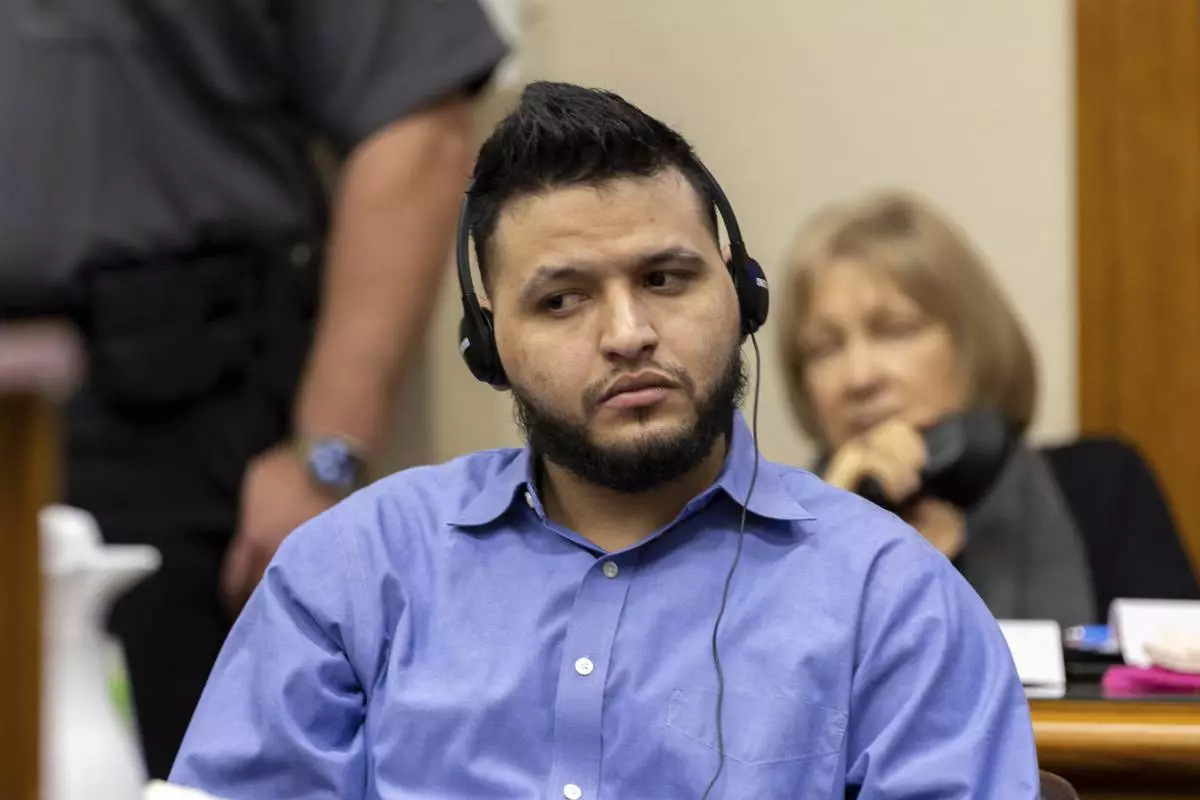
CORRECTS DATE Jose Ibarra appears at his trial at the Athens-Clarke County Superior Court on Tuesday, Nov. 19, 2024, in Athens, Ga. (Arvin Temkar/Atlanta Journal-Constitution via AP, Pool)
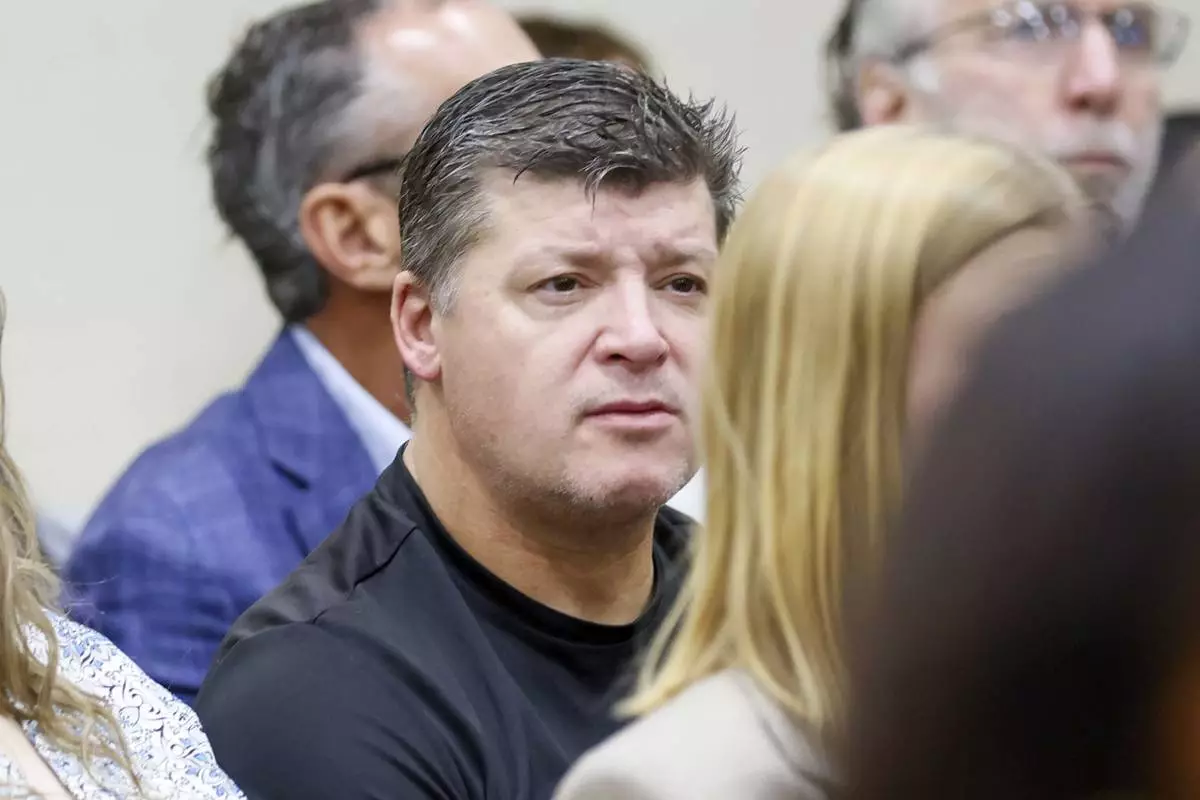
Jason Riley, center, Laken Riley's father, listens during the Jose Ibarra trial at Athens-Clarke County Superior Court on Monday, Nov. 18, 2024, in Athens, Ga. (Miguel Martinez/Atlanta Journal-Constitution via AP, Pool)
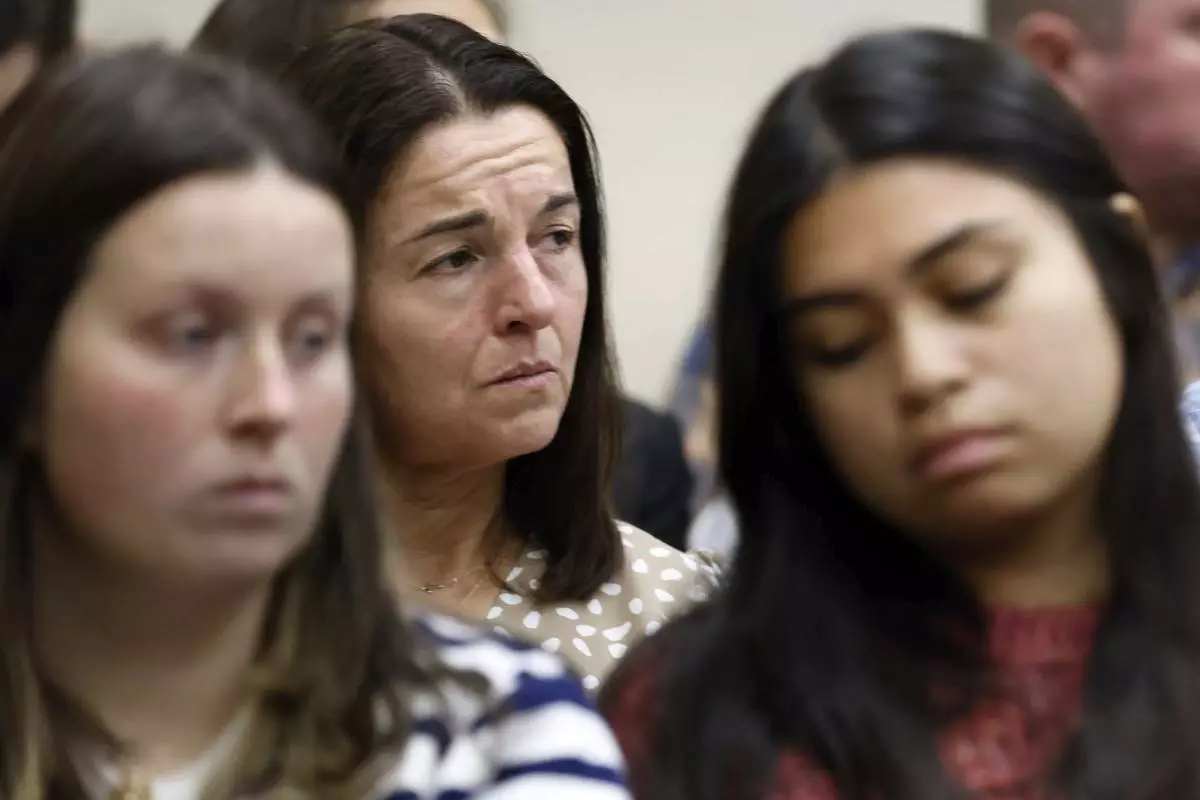
Allyson Phillips, mother of Laken Riley, second left, listens during the trial of Jose Ibarra at Athens-Clarke County Superior Court on Monday, Nov. 18, 2024, in Athens, Ga. (Miguel Martinez/Atlanta Journal-Constitution via AP, Pool)
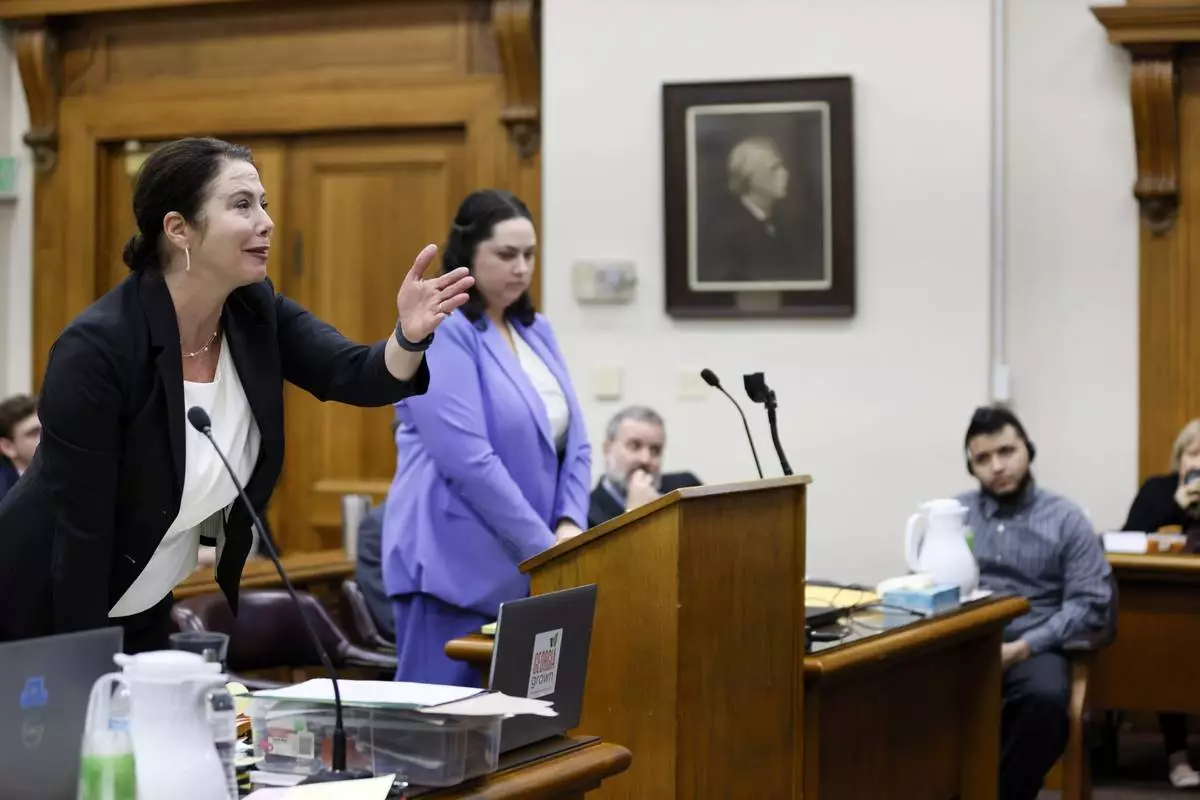
Prosecutor Sheila Ross's responds to Judge H. Patrick Haggard during the trial of Jose Ibarra at Athens-Clarke County Superior Court, Monday, Nov. 18, 2024 in Athens, Ga. (Miguel Martinez/Atlanta Journal-Constitution via AP, Pool)

Superior Court Judge H. Patrick Haggard speaks during the trial of Jose Ibarra at Athens-Clarke County Superior Court on Monday, Nov. 18, 2024, in Athens, Ga. (Miguel Martinez/Atlanta Journal-Constitution via AP, Pool)
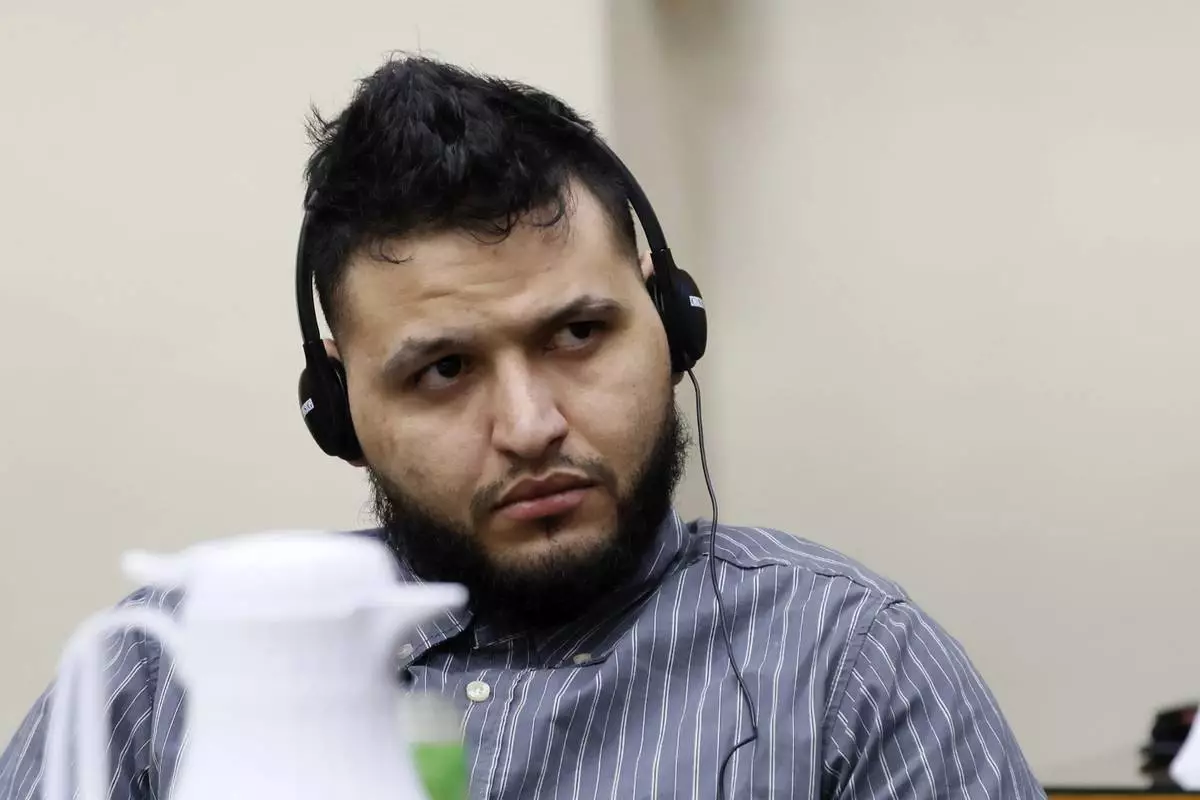
Jose Ibarra pays attention to a witness during his trial at the Athens-Clarke County Superior Court on Monday, Nov. 18, 2024, in Athens, Ga. (Miguel Martinez/Atlanta Journal-Constitution via AP, Pool)




